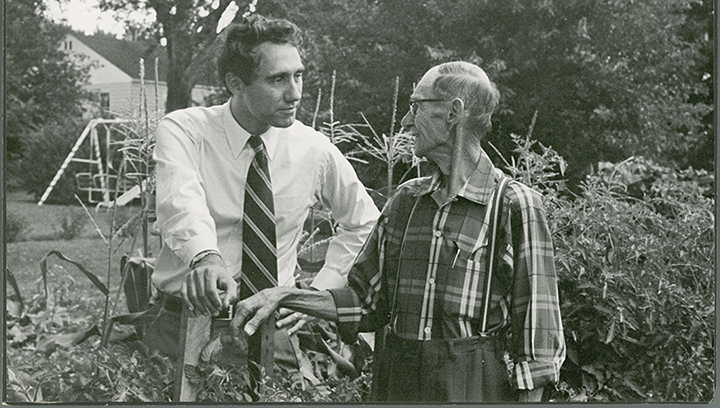Edward Mezvinsky

By the late 1960s, Mezvinsky began his own political career after being elected an Iowa State Representative for Johnson County. Mezvinsky, along with fellow Johnson County representatives Minette Doderer and Joseph Johnston, was part of what some saw as a broad state reform movement among Iowa’s younger elected officials. During the 1969 and 1970 legislative sessions, Mezvinsky personally argued for government reform, labor rights, and consumer advocacy, championing bills to regulate political lobbying in Iowa’s General Assembly, ensure collective bargaining for state employees, and pushing for better inspection practices for meat and poultry facilities operating in the state. In one instance, Mezvinsky clashed with U.S. Secretary of Agriculture L.B. Liddy over what he felt was the department’s inefficiency in properly funding meat inspections for Iowa, a failure that constituted, in Mezvinsky’s words, a waste of “taxpayers’ time and money.” 2
Despite his growing reputation as a reformer in the state legislature, Mezvinsky became disenchanted with the Iowa General Assembly during his first term, having largely failed to gain majority support for any part of his reformist agenda. In an interview with the local Iowa City press, Mezvinsky complained that Iowa’s legislature was “archaic” and too heavily influenced by lobbyists with special interest money.4 Toward the end of his first term as a state representative in 1970, Mezvinsky decided to challenge Republican incumbent Fred Schwengel (Davenport) for the 1st District U.S. Congressional seat. Running on a platform of tax reform, fighting inflation, and environmental advocacy, Mezvinsky narrowly lost the election with 49.6% of the vote to Schwengel’s 49.8% of the vote.5 Despite losing the election, Mezvinsky proved popular among the 1st District’s younger voters, especially in relation to his call to reexamine America’s role in Vietnam and for questioning the efficacy of the newly implemented draft lottery for military service to end the conflict.6
Following his narrow defeat in 1970, Mezvinsky prepared to offer another challenge to Schwengel in 1972. Two events between 1970 and the 1972 election helped Mezvinsky in his bid to unseat the Davenport Republican: the reapportionment of the U.S. 1st Congressional District to include more urban areas and ratification of the 26th Amendment to the Constitution, which lowered the voting age from twenty-one years to eighteen years. Having already proved popular with younger voters in the 1970 election, Mezvinsky filled his 1972 campaign staff with college-age workers.7 For the 1972 election, Mezvinsky built a broad coalition of support from business groups such as the bipartisan National Committee for an Effective Congress, local labor unions, and younger voters.8 Throughout the 1972 congressional campaign, Mezvinsky argued for Congressional control over the Vietnam conflict and tax reform to benefit the working and middle classes. In the campaign’s final two months, Mezvinsky also began criticizing the Republican Party for its association with two developing scandals from the Nixon White House, the Watergate break-in from March of 1972, in which five persons linked to Nixon’s re-election campaign were arrested for trying to electronically surveil the headquarters of the Democratic National Committee, and the discovery that International Telephone and Telegraph (ITT) may have contributed 400,000 dollars to the Republican Convention of 1972 in order to receive Nixon’s intervention into an Anti-Trust investigation from the Department of Justice.9
Mezvinsky won the 1st District race against Schwengel in contrast to national and state trends, which saw President Nixon win a landslide reelection against George McGovern of South Dakota and a return of many Republicans in Iowa state races. In the end, Mezvinsky carried the 1st District contest with majority support from urban areas, particularly Iowa City in Johnston County and in spite of having only won six counties compared to Schwengel’s vote majority in seven of the district’s counties.10
- 1. Box 20, Folder 2, Edward M. Mezvinsky Papers, MS 274, Iowa State University Library Special Collections and University Archives
- 2. Iowa City Press-Citizen, 29 December 1969.
- 3. Box 21, Folder 2, Edward M. Mezvinsky papers, Iowa State University Library Special Collections and University Archives.
- 4. Iowa City Press-Citizen, 23 April 1970.
- 5. Iowa City Press-Citizen, 4 November 1970.
- 6. Iowa City Press-Citizen, 2 December 1969.
- 7. According to a story in the local press, the average age of Mezvinsky’s campaign staff was in the lower 20s. Iowa City Press-Citizen, 12 September 1972.
- 8. Iowa City Press-Citizen, 17 October 1972.
- 9. Iowa City Press-Citizen, 21 October 1972. Further information regarding the ITT scandal can be found on the website of the Brennan Center for Justice at the New York University School of Law, https://www.brennancenter.org/blog/itt-affair-why-public-financing-matters-political-conventions.
- 10. Iowa City Press-Citizen, 8 November 1972.
